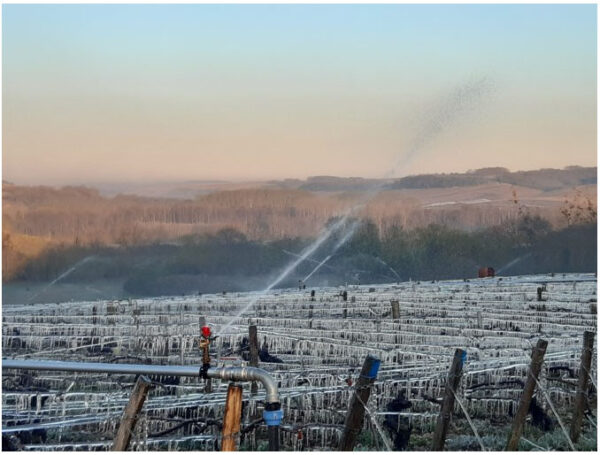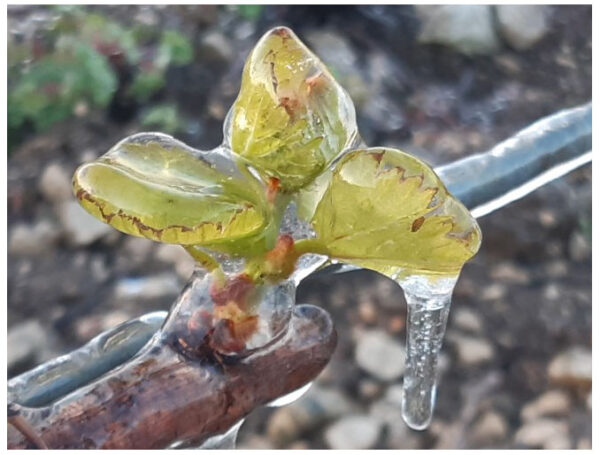In Burgundy like many other French wine regions, an exceptional frost episode early April 2021

Vintage 2021 starts with tough times, with extreme frosts in Burgundy. Here is the message from Alberic Bichot from our familly company.
Beaune, April 15, 2021
Dear Friends,
First of all, I would like to thank you very much for all your messages of solidarity following the cold wave that hit vineyards and crops last week. France experienced 3 nights of very intense frost on April 5, 6 and 7 and Burgundy was unfortunately not spared. The nights of April 13 and 14 were very cold again, especially in Chablis.
All regions, from Chablis to Beaujolais, were heavily affected, with winter-like temperatures that dropped to -7°C in places. These strong frosts impacted the buds which were beginning to develop following a period of high temperature rise in the previous two weeks.
The systems of frost protection set up in Chablis at Domaine Long-Depaquit, such as heating cables in part of Moutonne, water spraying in some plots of Grands Crus have been more effective than candles given the intensity of the frost. In Côte de Nuits, Côte de Beaune, Côte Chalonnaise and Mâconnais, the means used (wind turbines, candles, etc.) unfortunately did not give the expected results as the temperatures were too low. The effects of frost were also amplified in the plots where the humidity was very high and the snow present in many vines increased the damage.
In the frame of our organic and sustainable viticulture approach, we are constantly looking for alternatives that respect the environment and the vine. In anticipation of these freezing nights, our team at Domaine du Pavillon had sprayed apple pectin and zeolite powder (volcanic rock) in our plots of Beaune 1er Cru Clos des Mouches, Meursault 1er Cru Les Charmes and Corton-Charlemagne Grand Cru.
In both cases, the main objective was to lower the freezing point of the buds by the sugar contained in pectin or by taking advantage of the water absorption capacity of zeolite. Unfortunately these sprayings, which are still experimental, have not been effective given the very low temperatures. It is still a little early to assess precisely the extent of the potential crop loss because there are many disparities depending on the plots and the vegetation evolution (type of grape variety and genetic vigour, duration of the frost period, sun exposure, altitude, cultural practices, etc.)
However we can already note that chardonnays, which are always earlier in their vegetative cycle, have been strongly affected. For pinot noir, the assessment of the damage is more delicate. Some plots were less advanced than others, and we hope that the counterbuds, if left unaffected, will be productive.
In the memory of wine growers, Burgundy has never known such a situation even if some “old” ones remember a similar phenomenon in 1951…
As you can imagine, we feel a tremendous sense of frustration that adds to the current health situation but we are determined to prove once again our capacity of resilience. These “natural disasters” show us again that the climatic and ecological transition we have to face is a crucial and vital challenge and that we have to provide solutions at both individual and global levels.
Even though we are aware that the 2021 crop will be very poor, you can be assured that we will do our best to meet the needs of our customers.
Best regards,
Albéric BICHOT


